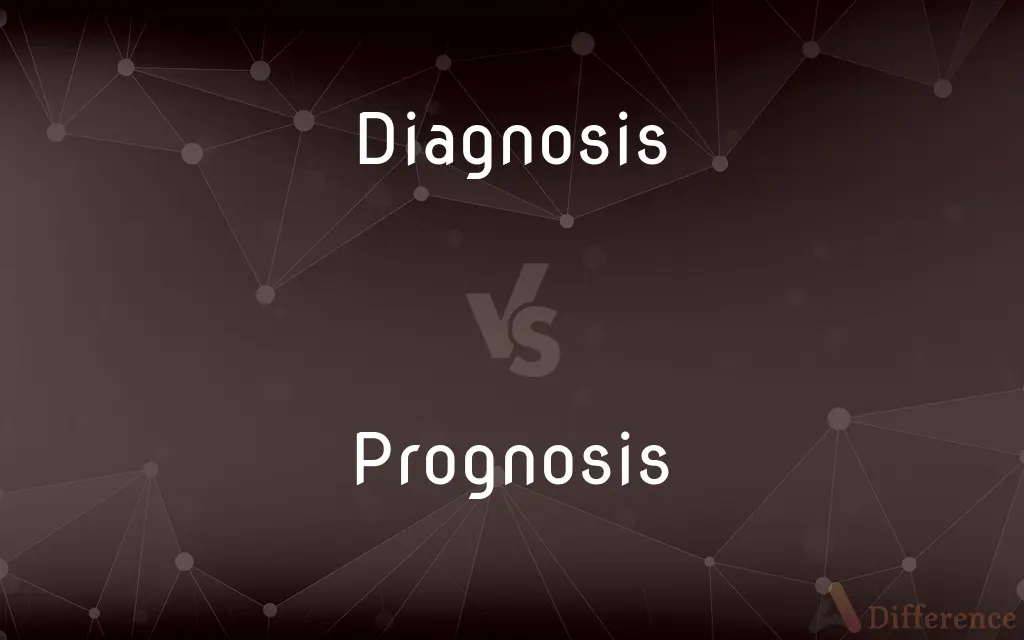Diagnosis vs. Prognosis — What's the Difference?
By Tayyaba Rehman — Updated on October 3, 2023
Diagnosis identifies a disease based on symptoms. Prognosis predicts the disease's future course and outcome.

Difference Between Diagnosis and Prognosis
Table of Contents
ADVERTISEMENT
Key Differences
Diagnosis and Prognosis are essential terms in the medical field. Diagnosis refers to the identification or naming of a disease based on the evaluation of its symptoms, test results, and other clinical data. Prognosis, on the other hand, pertains to the predicted progression and eventual outcome of the diagnosed disease.
The process of Diagnosis is imperative to determine the underlying cause of a patient's health issues. Using various medical tests, observations, and consultations, healthcare professionals arrive at a Diagnosis that best describes the ailment. In contrast, once a Diagnosis is established, Prognosis gives a forecast of how the ailment is likely to evolve, its duration, and its potential impact on the patient's life.
While Diagnosis seeks to label the health problem accurately, Prognosis offers an outlook on its implications. Diagnosis aims to pinpoint and categorize the health condition. Prognosis, meanwhile, looks ahead, suggesting potential outcomes, possible complications, and the general trajectory of the illness.
Both Diagnosis and Prognosis play pivotal roles in patient care. A clear and accurate Diagnosis guides therapeutic decisions, helping to determine the most suitable treatments. Prognosis helps prepare the patient and their families for future scenarios, whether promising or challenging, shaping their expectations and guiding long-term care plans.
Comparison Chart
Definition
Identification of a disease.
Prediction of the disease's progression.
ADVERTISEMENT
Relies on
Symptoms, tests, and clinical data.
Diagnosis, medical knowledge, and experience.
Timeframe
Current state.
Future progression.
Aim
Determine the nature of the illness.
Forecast the disease's potential outcomes.
Implication
Understanding what the patient has.
Understanding what might happen next.
Compare with Definitions
Diagnosis
Identification of a medical condition through evaluation.
Based on your symptoms, the Diagnosis is influenza.
Prognosis
Prediction regarding the progression of an illness.
With timely treatment, the Prognosis for this condition is good.
Diagnosis
Determining the nature of an illness using clinical information.
Blood tests confirmed the Diagnosis of anemia.
Prognosis
Forecast of a disease's potential outcome.
The Prognosis for early-detected breast cancer is often positive.
Diagnosis
The named disease a patient has based on medical assessment.
The radiologist's images supported the Diagnosis of a fractured bone.
Prognosis
Anticipated evolution of a disease over time.
Despite the severe Diagnosis, the Prognosis remains hopeful with newer treatments.
Diagnosis
Recognition of a disease through analysis of symptoms.
After considering the test results, the Diagnosis was diabetes.
Prognosis
Estimation of a disease's likely future course.
Given the advanced stage, the Prognosis is guarded.
Diagnosis
Medical conclusion about a person's health condition.
Based on the examination, the Diagnosis was high blood pressure.
Prognosis
Outlook based on the diagnosed medical condition.
The Prognosis varies depending on individual response to therapy.
Diagnosis
Diagnosis is the identification of the nature and cause of a certain phenomenon. Diagnosis is used in many different disciplines, with variations in the use of logic, analytics, and experience, to determine "cause and effect".
Prognosis
Prognosis (Greek: πρόγνωσις "fore-knowing, foreseeing") is a medical term for predicting the likely or expected development of a disease, including whether the signs and symptoms will improve or worsen (and how quickly) or remain stable over time; expectations of quality of life, such as the ability to carry out daily activities; the potential for complications and associated health issues; and the likelihood of survival (including life expectancy). A prognosis is made on the basis of the normal course of the diagnosed disease, the individual's physical and mental condition, the available treatments, and additional factors.
Diagnosis
The act or process of identifying or determining the nature and cause of a disease or injury through evaluation of patient history, examination, and review of laboratory data.
Prognosis
A prediction of the probable course and outcome of a disease.
Diagnosis
The opinion derived from such an evaluation.
Prognosis
The likelihood of recovery from a disease.
Diagnosis
A critical analysis of the nature of something.
Prognosis
A forecast or prediction
A gloomy prognosis for economic recovery.
Diagnosis
The conclusion reached by such analysis.
Prognosis
A forecast of the future course or outcome of a situation based on what is presently known; a prediction.
Diagnosis
(Biology) A brief description of the distinguishing characteristics of an organism, as for taxonomic classification.
Prognosis
(medicine) A forecast of the future course or outcome of a disease or disorder based on current medical knowledge.
Diagnosis
(medicine) The identification of the nature and cause of an illness.
Prognosis
The act or art of foretelling the course and termination of a disease; also, the outlook afforded by this act of judgment; as, the prognosis of hydrophobia is bad.
Diagnosis
The identification of the nature and cause of something (of any nature).
Prognosis
A prediction about how something (as the weather) will develop
Diagnosis
(taxonomy) A written description of a species or other taxon serving to distinguish that species from all others; especially a description written and published in Latin.
Prognosis
A prediction of the course of a disease
Diagnosis
Synonym of diagnose
Diagnosis
The art or act of recognizing the presence of disease from its signs or symptoms, and deciding as to its character; also, the decision arrived at.
Diagnosis
Hence, the act or process of identifying the nature or cause of some phenomenon, especially the abnormal behavior of an animal or artifactual device; as, diagnosis of a vibration in an automobile; diagnosis of the failure of a sales campaign; diagnosis of a computer malfunction.
Diagnosis
Scientific determination of any kind; the concise description of characterization of a species.
Diagnosis
Critical perception or scrutiny; judgment based on such scrutiny; esp., perception of, or judgment concerning, motives and character.
The quick eye for effects, the clear diagnosis of men's minds, and the love of epigram.
My diagnosis of his character proved correct.
Diagnosis
Identifying the nature or cause of some phenomenon
Common Curiosities
Does a positive Prognosis guarantee recovery?
A positive Prognosis indicates a favorable outcome, but it's not a guarantee, as individual responses can vary.
How does Prognosis differ from Diagnosis?
While Diagnosis identifies a disease, Prognosis predicts its future course and outcomes.
Can the Prognosis of a disease change over time?
Yes, Prognosis can change based on treatment response, new medical advancements, or changes in a patient's condition.
What is the primary purpose of a Diagnosis in medicine?
Diagnosis aims to accurately identify and label a medical condition.
What informs a Prognosis?
Prognosis is informed by the Diagnosis, past medical data, treatments available, and physician experience.
How does a doctor determine a Prognosis?
Doctors use the Diagnosis, knowledge of the disease's typical progression, available treatments, and clinical experience to determine a Prognosis.
Is the Diagnosis always definitive?
No, sometimes further tests are needed to confirm or refine a Diagnosis.
Can two people with the same Diagnosis have different Prognoses?
Yes, individual factors like age, overall health, and treatment response can lead to different Prognoses.
Why is an accurate Diagnosis crucial?
An accurate Diagnosis guides effective treatment and helps predict potential outcomes.
Can a Diagnosis be revised?
Yes, a Diagnosis can be revised if new symptoms arise or further tests suggest a different condition.
Share Your Discovery

Previous Comparison
Favour vs. Favor
Next Comparison
Javelin vs. SpearAuthor Spotlight
Written by
Tayyaba RehmanTayyaba Rehman is a distinguished writer, currently serving as a primary contributor to askdifference.com. As a researcher in semantics and etymology, Tayyaba's passion for the complexity of languages and their distinctions has found a perfect home on the platform. Tayyaba delves into the intricacies of language, distinguishing between commonly confused words and phrases, thereby providing clarity for readers worldwide.














































